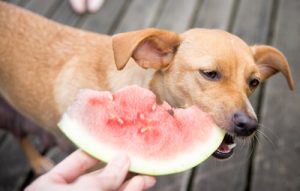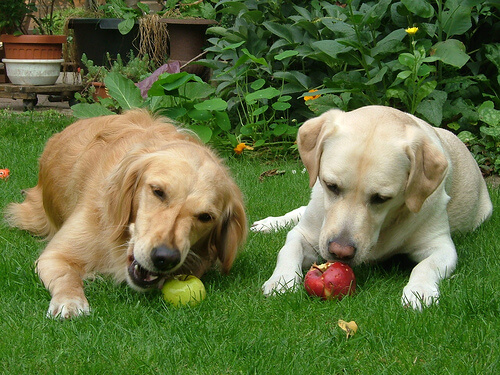Recommended Fruits for Dogs Diets

Surprisingly, specialists recommend balancing our pets’ diets with some fruits and vegetables. After all, fruits for dogs have nutrients and vitamins that meats do not have.
Fruits and dogs’ diets
Before starting to include fruit in our pets’ diets, we should take into account that their bodies are different from human beings’ bodies. Therefore, they don’t digest them in the same way. For that reason, it is important to monitor the quantity of fruit that is given to them. Fruit tends to contain a high percentage of sugar that cannot be digested by their digestive system.

The recommendation of veterinarians is to give no more than 15 to 20% of fruit to dogs. These percentages are directly proportional to the quantity of food that our dog consumes. An excess of fruit in a dog’s diet can make his system collapse and the animal would die.
Toxic and healthy fruits
Some fruit that we consume has highly toxic properties for dogs. Therefore, it is important to check which fruits are recommended for our dogs before giving one to them. Fruit that is considered toxic can wreak havoc on his health, even in small quantities.
Fruit that is healthy for dogs can be very beneficial to them. From the start, it helps because it changes up the flavors a bit so that the dog doesn’t get bored of his diet. It also provides fiber, antioxidants, and other substances that help to prevent some diseases and fight against constipation.
Appropriate fruit
If you know how to choose the best fruit for dogs, you can help discourage some of their unpleasant or unwelcome habits. For example, pineapple helps to fight against coprophagy. Put some slices of pineapple or a bit of the juice in the dog’s food, and he will stop smelling and putting his snout in feces.
It is essential that the seeds and “bones” of the fruit are taken out for dogs. There could be cyanide in those parts, which is very harmful to dogs.
Another important tip is to observe the symptoms that the dog might show when ingesting a fruit for the first time. If you see allergic or unfavorable reactions, you should immediately stop giving it to him and go to the veterinarian.
Recommended fruits for dogs
1. Apples
Apples contain high percentages of vitamin C and calcium. These nutrients help prevent and fight against stomach problems and intestinal inflammation that our dog could suffer from.
2. Cranberries
This fruit has vitamin C, fiber, and antioxidants, which contribute to the prevention of heart disease. The seeds need to be taken out because they are harmful to animals.
3. Persimmon
This is one of the main fruits recommended for dogs. Its properties help strengthen the immune system, diminishing the appearance of certain degenerative diseases and tumors.
4. Bananas
This fruit is ideal for dogs that suffer from constipation. However, you need to be careful because it could have collateral effects on the digestive system when given in large quantities.
5. Watermelon
It is one of the perfect fruits for summer. Having a large amount of water, watermelon helps hydrate our pet. Furthermore, by being a natural diuretic, it is beneficial to add it to the diet of pets who suffer from obesity. However, you need to do a tedious job of extracting the seeds.

Toxic fruits for dogs
1. Grapes and raisins
These fruits are very harmful to dogs. In large quantities, they cause kidney failure which could lead to death. In small quantities, the only risk is diarrhea.
2. Nuts
Dried fruit and nuts are very dangerous for dogs, given that they possess a substance that causes harm to the nervous, digestive, and muscular systems.
3. Avocados
This very appetizing fruit contains a toxic substance called Parisina that helps the plant support itself without fungus or mold. Although avocados are not damaging to human beings, specialists have confirmed that they could be fatal for some animals, such as horses, cats, and dogs.
If our pet consumes a small piece of any of the fruits above, he will surely not die. But he will need to be taken to the veterinarian for analyses.
This text is provided for informational purposes only and does not replace consultation with a professional. If in doubt, consult your specialist.